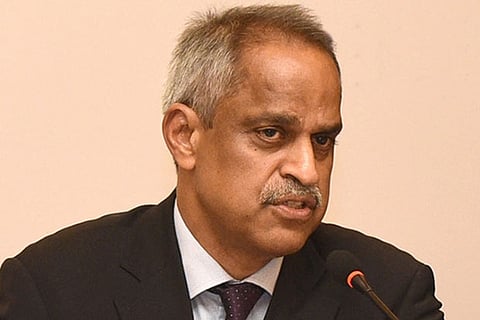

New Delhi
“That is our belief (that the current level of taxation will not lessen at least for first five years). It will be the same, that’s our belief, and it will increase a bit,” CBEC Chairman Najib Shah said.
Shah said the fitment of goods and services in the four tax slabs - 5 per cent, 12 per cent, 18 per cent and 28 per cent - is a work in progress. Apart from the tax rates, there will also be a cess on top of it, which will form the corpus to compensate the states for any revenue loss for the first five years of implementation of GST.
“The Council will determine the commodities which will have the cess. We will suggest, but all decisions will be taken by the Council because, after all, it is a question of revenue for the states and the Centre,” Shah says.
“Rates is an issue that is sensitive and will be determined only by the Council,” he said.
Revenue Secretary Hasmukh Adhia recently announced that the Council has increased the cGST (central GST) and sGST (state GST) peak tax rate from 14 per cent to 20 per cent each, amounting to a peak rate of 40 per cent. Though the current tax slabs will remain the same, the peak rate has been increased for future contingencies, Adhia had said.
CBEC Chairman also said GST is being looked upon as bringing about a possible 1-2 per cent increase in GDP. “Whenever we talk of GST, we talk of a possible increase in GDP by 1-2 per cent. That’s the sort of belief we have got, he said.
Where is that GDP going to come from?
He said with the implementation of GST, tax evasion should come down as all filings will be IT driven and evasion will get difficult. The GST regime is likely to be rolled out by July 1.
The Chairman said it will ensure that the laws regarding the new indirect tax regime are finalised by April 1, so that the industry has three months to prepare for the transition.
“That should give everybody time to adjust to the new requirements. We have trained 49,000 officers of the states and the Centre till last week. Goods and Services Tax Network (GSTN) - GST’s IT infrastructure arm - and CBEC together will now conduct trainings, so that people know how to file their returns,” he said.
“Outreach programmes from April 1 are going to be massive. We are targeting all major towns. We will first create a group of master trainers and then ask them to train the trade and industry,” he added.
Shah said he hoped the GSTN portal is able to handle the massive rush that it will see post July 1.
“Existing VAT dealers, central excise assessees and service tax assessees are approximately over six million. The total number of assessees (under GST) will be lesser than that as there is some overlap. Instead of filing three returns, they would be filing one return now. When the final migration takes place, then only we will know the exact number of assessees,” he said.
Though any new change will have hiccups because of the existing legacy issues, the Central Board of Excise and Customs is trying to ensure the transition is smooth, he said.
“It’s a new law, all the states and the Centre are moving to a new taxation regime. So there are going to be challenges because not only the trade and industry but the administration also has to change. All existing legacy issues may continue for some time,” Shah said.
One of the hurdles before CBEC seems to be the concern of officials that their work load will reduce drastically, as 90 per cent of assessees below Rs 1.5 crore turnover will be assessed by the states.
“There is a certain section of officers that is concerned that perhaps they would be having lesser work under the GST. We have flagged the concerns, but the government will take a final call. The 90 per cent assessees below Rs 1.5 crore turnover to be assessed by states is a decision taken by government. That is an administrative arrangement,” he said.
“We believe there would be enough work. Apart from the work, there are other concerns as well. We will be addressing those concerns as well,” he added.
Shah said they will not require any additional staff as of now. “We will manage with the existing staff. As we go ahead, we will see how the workload is,” he said.
Visit news.dtnext.in to explore our interactive epaper!
Download the DT Next app for more exciting features!
Click here for iOS
Click here for Android